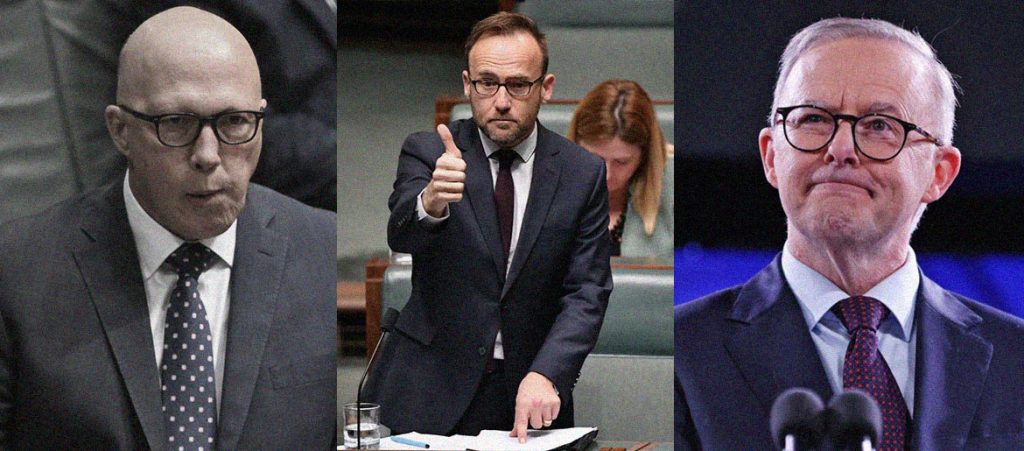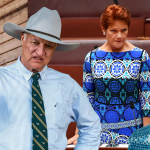
It’s been one year since the 2022 federal election, and something unusual has happened that’s worth talking about. The two-party dynamic has shifted, big time, and the Liberal Party is no longer in the role of Opposition. A lot has been said about the total breakdown of the Liberal party in the past 12 months – it’s been entertaining and unbelievable to watch unfold. But what does it really mean for us that one half of our two-party system is unable to do its job in Government? Reframing our understanding of who is playing the Opposition role in parliament might help explain why the Labor government isn’t doing what we thought and hoped it would.
How does an Opposition behave?
There are two key reasons why you can’t really consider the Liberals a functional Opposition party anymore. First, they’re not behaving the way an Opposition should (as in, making coherent arguments for debate and putting up genuine policy suggestions).
Peter Dutton’s budget reply speech is the moment it became clear to me that we weren’t going to get any real shit from the 2023 Liberals. Read it for yourself here, but be warned: the thing makes no sense. According to Dutton, Labor’s plans – to give a small amount of extra funding to welfare recipients, or take $500 off electricity bills – are bad because they inject extra cash into the economy, making inflation worse. But the Liberals’ promises – like letting people use their superannuation for a house deposit – are really good despite also… injecting extra cash into the economy, making inflation worse.
It’s all so unserious. With no coherent values, everything has become reactionary. Their economic policies are not based in a reality that the rest of us live in. They have no meaningful suggestions to tackle climate change, which is the single biggest threat to national security (supposedly one of their strengths).
Instead, they are behaving like a minority party. Guided by hard-right members including Peter Dutton, Angus Taylor and Alex Antic, the Liberals are now preoccupied with ‘hot takes’ on topics that most everyday Australians disagree with. You can see it in the 90s-style anti-immigration rhetoric currently being pushed. Who is this meant to appeal to, when almost 30% of the population was born overseas and almost 50% have on parent born overseas?
Supporters have noticed the shift. In the most recent set of state, federal and by-elections, centrist voters have abandoned the party in favour of independent or even ALP candidates.
The opposition of values
This is obviously really bad for the Liberal party, but it also means something significant for us. The way our system works, in theory at least, is by having a constant push-pull between conservative and progressive forces. This is how Government and Opposition play the tug of war with ideas – a conservative government will be challenged by a more progressive opposition, and vice versa.
Herein lies the second reason the Liberal party is no longer a functional opposition: both Labor and Liberal parties are conservative. They’re pulling on the same end of the rope.
I’ve spoken to a lot of people – young and old – who are really disappointed in Labor’s first year in government, but we shouldn’t be too surprised to see them creep to the right. They are now playing to a base that is slightly more right-leaning than before, and they want to keep the new voters they’ve gained from the Coalition.
But if a conservative government must face a progressive Opposition, who’s really playing that role in federal parliament now? The Greens, with the help of some key independents.
They fit both criteria. Ideologically, they are challenging Labor to consider progressive, even leftist ideas – the policies on affordable housing are a prime example.
And now that Liberal opposition is essentially meaningless, the only real interrogation and debate of policies we’re getting is from this unofficial Greens-Indies coalition. They are behaving like a real Opposition by genuinely engaging in the process; clearly stating amendments they want in legislation, explaining the reasons why. They are participating in active negotiation around those requests with the Labor government, compromising sometimes and holding firm at others. Regardless of whether you agree with the Greens’ or Independents’ policy positions, you can’t deny this is what parliament is supposed to look like.
An effective Opposition is vital for Australian democracy; it’s how we improve policy and decision-making. A true testing and debate of ideas has the potential to be very productive and bring about the changes Australia needs – tax reform, bringing welfare above poverty levels, constitutional recognition of Aboriginal and Torres Strait Islanders (and, hopefully, a treaty).
I can’t imagine the traditional Labor-Liberal binary achieving any of these things. Now, we might have a real shot.
Adjusting expectations
We have to reset our expectations though, because this is a big shift in the political norms. We still generally treat the Liberal party as if they are genuine Opposition. Particularly in the media, Dutton, Sussan Ley, Angus Taylor & Co. get the airtime that you’d expect for the Opposition. This doesn’t reflect the fact that the party is now less representative of Australia than ever before. If they now only stand for a minority of voters, they Liberals are arguably getting more opportunity than they deserve to influence our perception of what Australia is.
Radical thought: imagine if we treated the current Liberal party like a minority party. What if political coverage, for now, defaulted to presenting the Labor and Greens-or-Independent view on an issue? If the Liberals were only asked for comment on specific topics – what would those topics even be?
That won’t happen, of course. But I do think it’s worth young Australians and voters who want this country to be better to adjust our mindset. The Liberals are not the Opposition anymore, and that could be a great thing. There is so much opportunity that can come from a Labor government facing a genuinely progressive Opposition.




Comments are closed.